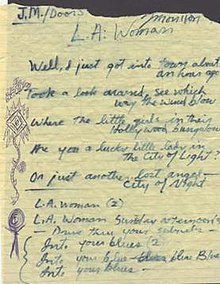L.A. Woman (song)
| "L.A. Woman" | |
|---|---|
 Morrison's handwritten original lyrics | |
| Song by the Doors | |
| from the album L.A. Woman | |
| Released | April 1971 |
| Recorded | December 1970 – January 1971 |
| Studio | The Doors' Workshop, Los Angeles |
| Genre | |
| Length | 7:49 |
| Label | Elektra |
| Songwriter(s) | The Doors[2] |
| Producer(s) |
|
"L.A. Woman" is a song by the American rock band the Doors. The song is the title track of their 1971 album L.A. Woman, the final album to feature Jim Morrison before his death on July 3, 1971. LA Weekly named it No. 1 on their list of "the 20 best songs about the city of Los Angeles".[3]
In 1985, fourteen years after Morrison's death, Ray Manzarek directed,[4] and Rick Schmidlin produced a music video for the song. It was aired on MTV and included in the Doors film Dance on Fire.[5]
Lyrics[]
"L.A. Woman" has been viewed as Morrison's "final goodbye" to Los Angeles, before his move out to Paris.[6] The song's lyrics draw inspiration from John Rechy's transgressive novel City of Night, published in 1963.[7][8] The track's title is expressed as a metaphor, indicating L.A. (Los Angeles) as a woman.[4] In author Melissa Ursula Dawn Goldsmith's description, it is also used to describe the city's topography and atmosphere.[9]
In the bridge, Morrison repeats the phrase "Mr. Mojo Risin'," which is an anagram of his name "Jim Morrison".[10] Doors drummer John Densmore later explained the story of the line:
After we recorded the song, he wrote "Mr. Mojo Rising" on a board and said, "Look at this." He moves the letters around and it was an anagram for his name. I knew that mojo was a sexual term from the blues, and that gave me the idea to go slow and dark with the tempo. It also gave me the idea to slowly speed it up like an orgasm.[11]
A yellow sheet of lined A4 paper with the lyrics of the track, handwritten by Morrison, was auctioned in Berkshire, UK for £13,000 on August 4, 2009.[12]
References[]
- ^ Jump up to: a b Brodsky, Greg. "11 Classic Rock Driving Songs: Reader Favorites". Best Classic Bands. Retrieved March 28, 2021.
- ^ Botnick, Bruce (2007). L.A. Woman (40th Anniversary edition CD booklet). The Doors. Rhino Records. R2-101155.
- ^ "The 20 Best Songs Ever Written About L.A." LA Weekly. October 15, 2014. Retrieved June 19, 2019.
- ^ Jump up to: a b Mr. Mojo Risin': The Story of L.A. Woman Q&A and Performance. Retrieved August 19, 2020 – via YouTube.
- ^ "The Doors: The Soft Parade – A Retrospective (1991)". Movies & TV Dept. The New York Times. Baseline & All Movie Guide. 2012. Archived from the original on November 2, 2012. Retrieved April 13, 2021.
- ^ Riordan, James; Prochnicky, Jerry (October 30, 1992). Break on Through: The Life and Death of Jim Morrison. HarperCollins. pp. 429–430. ISBN 978-0-688-11915-7.
- ^ Allen, Jim. "The Story Behind the Songs of the Doors' Last Hurrah, L.A. Woman". Ultimate Classic Rock.
- ^ Inman, Davis (February 20, 2012). "The Doors, "L.A. Woman"". American Songwriter. Retrieved November 7, 2019.
- ^ Dawn Goldsmith, Melissa Ursula (2019). Listen to Classic Rock! Exploring a Musical Genre. ABC-CLIO. p. 95. ISBN 978-1440865787.
- ^ "Mr Mojo Risin'". BBC Radio 2. June 29, 2011. Retrieved April 8, 2014.
- ^ Weiss, Jeff (January 19, 2012). "L.A. Woman: Track List". LA Weekly. Retrieved February 13, 2021.
- ^ "Jim Morrison's lyrics open The Doors at auction for $20,700". Paulfrasercollectibles.com. Archived from the original on March 18, 2012. Retrieved September 4, 2014.
External links[]
- Songs written by John Densmore
- Songs written by Robby Krieger
- Songs written by Ray Manzarek
- Songs written by Jim Morrison
- 1971 songs
- 1990 singles
- The Doors songs
- Billy Idol songs
- Songs about California
- Songs about Los Angeles
- Song recordings produced by Bruce Botnick